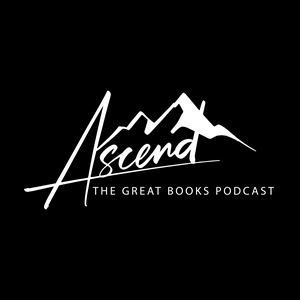Today on Ascend: The Great Books Podcast, Deacon Harrison Garlick and Dr. Justin Jackson host a Q&A on Sir Gawain and the Green Knight. They explore major themes such as the role of femininity, the moral dilemmas faced by Gawain, and the significance of the girdle.
Visit thegreatbookspodcast.com for our reading schedule!
Check out our episodes on Sir Gawain and the Green Knight and our study guide!
Visit Professor Jackson's awesome SUBSTACK.
The conversation highlights Gawain's character development, the tension between chivalric ideals and Christian morality, and the Green Knight's role as a tempter. Through a detailed analysis, they uncover the layers of meaning within the poem, emphasizing the intentional tension crafted by the poet.
Join our Patreon page to be able to submit questions in the future!
Chapters
00:00 Introduction to the Podcast and Guests
03:13 Teaching 'Sir Gawain and the Green Knight'
06:34 The Role of Women in the Poem
12:27 The Tension Between Pagan and Christian Elements
21:57 Gawain's Moral Dilemmas and Compartmentalization
28:05 The Confession Scene and Its Implications
37:02 Confession and Contrition
40:56 The Green Knight's Dual Role
51:58 Chivalry, Cowardice, and the Girdle
01:02:50 Symbolism of Colors in Gawain
01:07:31 The Intensity of the Green Knight
01:08:36 Gawain's Confrontation and Internal Conflict
01:11:29 The Symbolism of the Green Girdle
01:17:24 The Ending: Bliss and Blunder
01:26:19 Final Thoughts on Gawain's Journey
Keywords
Sir Gawain, Green Knight, themes, femininity, chivalry, morality, confession, literature, medieval, analysis, Sir Gawain, Green Knight, chivalry, medieval literature, symbolism, courtly love, Morgan Le Fay, color symbolism, moral lessons, literary analysis, great books, philosophy, Catholic, Catholicism
Takeaways
The tension in the poem is intentional and significant.
Gawain's character is complex, showcasing both strengths and weaknesses.
The role of femininity is prominent and influential in the narrative.
The girdle symbolizes Gawain's internal conflict and moral struggles.
Gawain's confession scene raises important questions about sincerity and contrition.
The Green Knight serves as a tempter, challenging Gawain's virtues.
The poem explores the interplay between pagan and Christian ideals.
Gawain's journey reflects a maturation of character and understanding.
The hunting scenes parallel Gawain's temptations and moral choices.
The...


